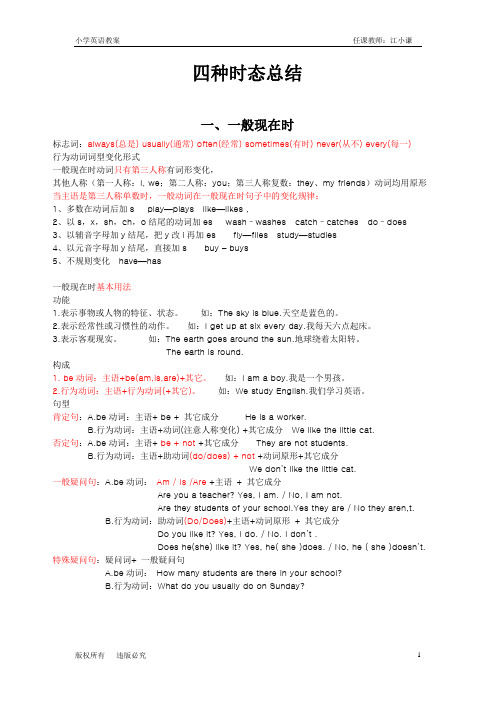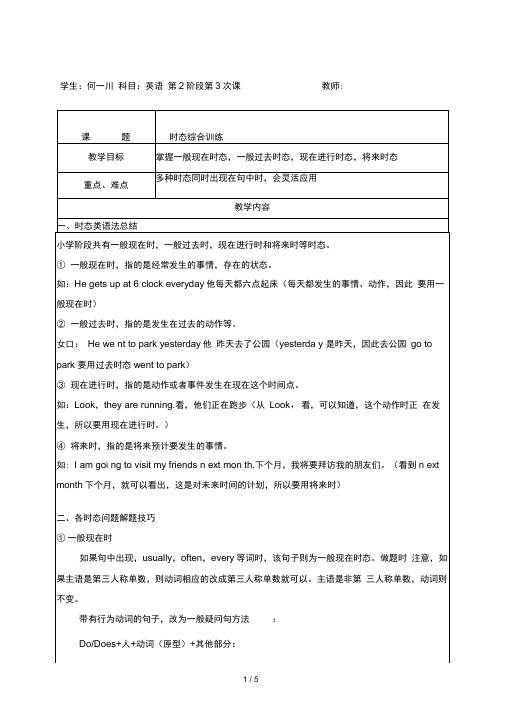(完整word版)小学英语语法时态讲解与归纳一般现在时
(完整版)小学英语时态总结

四种时态总结一、一般现在时标志词:always(总是) usually(通常) often(经常) sometimes(有时) never(从不) every(每一)行为动词词型变化形式一般现在时动词只有第三人称有词形变化,其他人称(第一人称:I, we;第二人称:you;第三人称复数:they、my friends)动词均用原形当主语是第三人称单数时,一般动词在一般现在时句子中的变化规律:1、多数在动词后加s play—plays like—likes ,2、以s,x,sh,ch,o结尾的动词加es wash–washes catch–catches do–does3、以辅音字母加y结尾,把y改i再加es fly—flies study—studies4、以元音字母加y结尾,直接加s buy – buys5、不规则变化have—has一般现在时基本用法功能1.表示事物或人物的特征、状态。
如:The sky is blue.天空是蓝色的。
2.表示经常性或习惯性的动作。
如:I get up at six every day.我每天六点起床。
3.表示客观现实。
如:The earth goes around the sun.地球绕着太阳转。
The earth is round.构成1. be动词:主语+be(am,is,are)+其它。
如:I am a boy.我是一个男孩。
2.行为动词:主语+行为动词(+其它)。
如:We study English.我们学习英语。
句型肯定句:A.be动词:主语+ be + 其它成分He is a worker.B.行为动词:主语+动词(注意人称变化) +其它成分We like the little cat.否定句:A.be动词:主语+ be + not +其它成分They are not students.B.行为动词:主语+助动词(do/does) + not +动词原形+其它成分We don’t like the little cat.一般疑问句:A.be动词:Am / Is /Are +主语+ 其它成分Are you a teacher? Yes, I am. / No, I am not.Are they students of your school.Yes they are / No they aren,t.B.行为动词:助动词(Do/Does)+主语+动词原形+ 其它成分Do you like it? Yes, I do. / No. I don’t .Does he(she) like it? Yes, he( she )does. / No, he ( she )doesn’t.特殊疑问句:疑问词+ 一般疑问句A.be动词:How many students are there in your school?B.行为动词:What do you usually do on Sunday?一般现在时动词be和have的变化形式1.动词Be 叫连系动词, 用法:第一人称单数用am,第三人称单数用is,其它人称用are。
(完整word版)外研版小学英语语法总复习知识点归纳

(完整word版)外研版小学英语语法总复习知识点归纳外研版小学英语语法总复知识点归纳一、时态1.一般现在时(1)表示经常发生的动作或事情,通常用“usually通常,often常常,every…每…。
sometimes有时,always总是,”等词。
(2)基本结构:主语I / You / We / They /He / She / It肯定句:主语+动词原形或动词第三人称单数形式否定句:主语+don’t + 动词原形或者doesn’t + 动原一般疑问句(Yes/No) Do…。
Yes。
I do.No,I don’t.Does…(动词原形)…?Yes,he/she does。
No,he/she doesn’t.特殊疑问句What do …。
How does she…(动词原形)…?(3)动词第三人称单数方式(同名词单数酿成复数办法不异)1.普通情形+s如:walk-walks2.辅音字母+y结尾去y +ies fly-flies3.结尾是s。
x,sh。
ch +es watch-watches4.结尾是0 +es do-does。
go-goes5.特殊have-has2.现在进行时(1)表示正在发生的动作,通常用“now现在。
look看,XXX听”.(2)根本方式: be +动词-ingeg: I am(not) XXX.You/We/They are(not) reading。
He/She/It is(not) eating.What are you doing。
Is he reading?(3)动词的目前分词方式(动词+ing)普通情形+ing walk—walking末端是不发音的e-e+ingcome—coming重读闭音节双写末了一个字母+ingswim-swimming。
run-running3.一般过去时(1)表示过去已经发生的事情,通常用“last …上一个…。
just now刚才,many years ago许多年前,XXX昨天”等词。
人教版小学英语语法--时态总结(一般现在时-一般过去式-现在进行时-一般将来时)

学生:何一川科目:英语第2阶段第3次课教师:学生:何一川科目:英语第2阶段第3次课教师:带有Be动词的句子,改为一般疑问句的方法:Be+人+其他:He is a good student.-----s he a good student?(第三人称单数用does开头,非第三人称单数用do开头,一二人称互换,l--You,We-You)例题:I usually go to school by bike. --------- Do you usually go to school by bike? (该句人称要互换)He ofte n watches TV on Sundays- ------ D oes he ofte n watch TV on Sun days?They often play football after dinner. ----------- Do they often play football after dinn er?②一般过去时女口果句中出现,last week/last weekend/last month/last year yesterday the day before yesterday X days ago (其中,last是“上一” d的意思,ago是“…前”的意思)等词时,该句子则为一般过去时态。
做题时,只要把动词,改成过去时态。
关键是记忆总结不规贝U动词的过去式。
如:go---went,do---did,swim--swam例题:I visited my grandmother last weekend.They bought a new bike10 days ago.He was ill yesterday.改为一般疑冋句:Did +人+动词(原型)+其他?③现在进行时如果句中出现,look,listen,now等词(看,XX正在做某事;听,XX正在做某事;现在,XX正在做某事)。
小学英语语法一般现在时详细讲解

主语(I/We/You/They)+ do+not+动词原形+其他
如:I don’t stay at home on Saturdays. They don’t have sports every day.
主语(He/She/It)+ does+not+动词原形+其他
特殊疑问句: 疑问词+一般疑问句? 直接回答,而不用yes 或no.
5.一般现在时的句型变换 1) I usually play football on Friday. 改为一般疑问句: Do you usually play football on Friday? 对划线部分提问: What do you usually do on Friday? 2) My father go to work by bike everyday. 对划线部分提问: How does your father go to work everyday?
3. 表示永恒不变的真理;
The moon goes round the earth.
一. be动词的一般现在时
be动词: 主语 + be +其它
如:I am a boy. 我是一个男孩。问句:
4) 特殊疑问句: 疑问词+ do/does+主语+动词原形+其他? 如: What do you want? What does she want? What time do you have lunch? What time does she have lunch? What do you do? What does she do? How do you spell it? How does he spell it?
小学英语语法-一般现在时详细讲解

小学英语语法-一般现在时详细讲解一般现在时是英语语法中最基础也是最常用的时态之一。
它表示的是习惯性、经常性和普遍性的行为或状态。
在本文中,我将详细介绍一般现在时的形式、用法和注意事项。
一、一般现在时的形式一般现在时的肯定句的基本结构是:主语+谓语动词+其他。
谓语动词在第三人称单数形式时要加上-s或-es。
例如:- I eat breakfast every morning.(我每天早上吃早饭。
)- She goes to school by bus.(她坐公共汽车去学校。
)否定句的结构是:主语+do not/does not+动词原形+其他。
例如:- I do not like coffee.(我不喜欢咖啡。
)- He does not play football.(他不踢足球。
)疑问句的结构是:Do/Does+主语+动词原形+其他?例如:- Do you like ice cream?(你喜欢冰淇淋吗?)- Does she go to the park every weekend?(她每个周末去公园吗?)二、一般现在时的用法第1页/共4页1. 表示习惯或经常性的动作:- I write in my diary every night.(我每天晚上写日记。
)- They play basketball every Sunday.(他们每个星期天打篮球。
)2. 表示客观事实、自然规律或科学真理:- Water boils at 100 degrees Celsius.(水在100摄氏度时煮沸。
)- The sun rises in the east.(太阳从东方升起。
)3. 表示感觉、想法和喜好:- I love chocolate.(我喜欢巧克力。
)- He hates to wake up early.(他讨厌早起。
)4. 表示现时状态或现时临时的动作:- I am a student.(我是一个学生。
小学英语语法时态讲解与归纳一般现在时

千里之行,始于足下。
小学英语语法时态讲解与归纳一般现在时一般现在时(Simple Present Tense)是表示经常性、习惯性或普遍性的动作或状态的时态。
它用于描述我们现在经常或总是发生的动作、习惯、经验、事实和固定的真理。
下面是小学英语语法时态讲解与归纳一般现在时的内容:1. 构成一般现在时的肯定句结构为:主语 + 动词原形(第三人称单数加-s)+ 其他。
例如:- I play soccer every Saturday.(我每个星期六踢足球。
)- She eats an apple every morning.(她每天早上吃一个苹果。
)2. 第三人称单数的变化在一般现在时中,第三人称单数的动词要加上-s、-es或-ies。
例如:- She plays soccer every Saturday.(她每个星期六踢足球。
)- He eats an apple every morning.(他每天早上吃一个苹果。
)- My brother watches TV every night.(我的哥哥每天晚上看电视。
)3. 否定句和疑问句第1页/共3页锲而不舍,金石可镂。
- 否定句:在动词前加do not(don't)或does not(doesn't)。
例如:- I don't play soccer every Saturday.(我不是每个星期六踢足球。
)- She doesn't eat an apple every morning.(她不是每天早上吃一个苹果。
)- 疑问句:将助动词do(does)提到主语前。
例如:- Do you play soccer every Saturday?(你每个星期六踢足球吗?)- Does she eat an apple every morning?(她每天早上吃一个苹果吗?)4. 频率副词频率副词用来修饰动词,表示动作发生的频率。
小学英语时态总结及用法
小学英语时态总结及用法一、一般现在时用法:1.表示经常性、习惯性的动作或存在的状态。
2.表示客观事实或普遍真理。
例句:I often go to school by bus.(我经常乘公交车去上学。
)The sun rises in the east.(太阳从东方升起。
)二、现在进行时表示正在进行的动作或情况。
常与now, at this moment, these days等时间状语连用。
例句:They are playing football now.(他们现在正在踢足球。
)I am studying English these days.(这些天我正在学习英语。
)三、一般过去时用法:表示过去某个时间发生的动作或存在的状态。
常与yesterday, last week, ago等时间状语连用。
例句:I went to the park yesterday.(我昨天去了公园。
)She had a cold last week.(她上周感冒了。
)四、一般将来时用法:表示将来某个时间要发生的动作或存在的状态。
常与tomorrow, next week, in the future等时间状语连用。
例句:I will go to the zoo tomorrow.(我明天要去动物园。
)They are going to have a party next week.(他们下周要举行一个聚会。
)五、现在完成时用法:表示过去发生的动作对现在造成的影响或结果。
常与already, yet, just, ever, never等副词连用。
例句:I have already finished my homework.(我已经完成了我的家庭作业。
)She has never been to Beijing.(她从未去过北京。
)通过以上总结,希望同学们能够更好地掌握小学英语中的基本时态及其用法,为日后的英语学习打下坚实的基础。
(完整word版)小学英语语法时态讲解与归纳一般现在时,推荐文档
小学英语语法时态讲解与归纳~~ 一般现在时一. 意义:表示经常发生的事情,动作或存在的状态二. 构成及变化1.be动词的变化。
肯定句:主语+be(am ,is ,are)+其它。
如:I am a boy.我是一个男孩。
否定句:主语+ be + not +其它。
如:He is not a worker.他不是工人。
一般疑问句:Be +主语+其它。
如:-Are you a student?-Yes. I am. / No, I'm not.特殊疑问句:疑问词+一般疑问句。
如:Where is my bike?2. 行为动词的变化。
l、当主语为第一,二人称及复数时,助动词为do肯定句:主语+动词原形(+其它)。
如:We often play basketball after school.否定句:主语+ don't+动词原形(+其它)。
如:we don’t play basketball after school.一般疑问句:Do +主语+动词原形+其它?如:Do you often play basketball after school l?Yes, we do. / No, we don't.特殊疑问句:疑问词+以do开头的一般疑问句?如:What do you often do after school ?2、当主语为第三人称单数时,助动词为does肯定句:主语+动词三单式(+其它)。
如:He swims well.否定句:主语+ doesn’t+动词原形(+其它)。
如:He doesn’t swim well..一般疑问句:Does +主语+动词原形+其它。
如:Does he swim well ?Yes, he does. / No, he doesn't.特殊疑问句:疑问词+以does开头的一般疑问句?如:How does your father go to work?三.第三人称单数的动词变化规则(只有在第三人称为主语的肯定句中,动词才用三单式)(1)多数动词直接加s:runs gets likes collets takes plays climbs…….(2)结尾是s, x, sh, ch, o,前为辅音字母,结尾加es :watches goes does washes brushes(3)动词末尾y前为辅音:将y改为i加es:study→studies fly→flies carry→carries cry→cries但在y前如果为元音则直接加s:buys says四.时间标志:always总是, usually经常, often经常, sometimes 有时,every…每~一般现在时练习题(1)I.用下列单词的适当形式填空1.We often___________(play) in the playground.2.He _________(get) up at six o’clock.3.__________you _________(brush) your teeth everymorning?4.What________________(do) heusually________________(do) after school?5.Danny ________________(study) English, Chinese,maths, science and Art at school.6.Mike sometimes __________(go) to the park with hissister.7.At eight at night, she __________(watch) TV with hisparents.8.________ Mike________(read) English every day?Ⅱ单项选择。
小升初英语语法解析:一般现在时
小升初英语语法解析:一般现在时小升初的英语考试内容涉及并不多,下面就是小编给大家带来的小学英语语法一般现在时的语法解析,希望能帮助到大家!小升初英语语法解析:一般现在时一:定义一般现在时 (The simple present tense) :一般现在时表示现在经常反复发生的动作,存在的状态或习惯性的动作的时态。
二、一般现在时的用法:1.表示经常或习惯性的动作。
常与often(经常), always(总是), sometimes(有时), every day(每天)on Sundays/Mondays 等表示频度的时间状语连用。
一般现在时的时间状语有:today, often, sometimes, always, usually, every day ( week, month, year,…), this year, once a week ( month, year, …)例句:I get up at 6 o’clock every day. 我每天早上6点钟起床。
He often goes to school by bike. 他经常骑自行车去学校。
2. 表示客观事实,普遍真理。
例句:Two and two is four. 二加二等于四。
The earth moves around the sun. 地球绕着太阳转。
三、一般现在时的结构:一般现在时用行为动词的原形,但第三人称单数作主语时,动词的词尾要加-s 或 - es。
以下将对一般现在时的肯定句、否定句、疑问句及其答语的构成加以说明:A、当谓语是be动词时,构成为:肯定句:主语 + be动词 ( am, is, are ) + 其他。
I am a student.否定句:主语+be动词 ( am, is, are ) + not +其他。
I am not a student.疑问句:be动词 ( am, is, are ) + 主语 + 其他? Am I a student?肯定回答:Yes,主语 + be动词 ( am, is, are ) Yes, I am.否定回答:No,be动词 ( am, is, are ) + not. No, I am not.B、当谓语是行为动词时,构成有两种:(1)当主语为非第三人称单数时:肯定句:主语+动词原形+其它We watch TV at home.否定句:主语+don't+动词原形+其它We don’t watch TV at home.一般疑问句:Do+主语+动词原形+其它Do we watch TV at home?肯定回答:Yes,主语+doYes, we do.否定回答:No,主语+don'tNo, we don’t.(2)当主语是第三人称单数时:肯定句:主语+动词s+其它She reads books.否定句:主语+doesn't+动词原形+其它She doesn’t read books.一般疑问句:Does+主语+动词原形+其它Does she read books?肯定回答: Yes,主语+does.Yes, she does.否定回答: No,主语+doesn't.No, she doesn’t.四、动词加-s 或-es (动词第三人称单数):当主语是第三人称单数时,谓语动词需用动词的“三单变化”加-s 或-es。
小学英语语法_一般现在时详细讲解
千里之行,始于足下。
学校英语语法_一般现在时具体讲解一般现在时(Simple Present Tense)是英语中最基本的时态之一,用来表达经常性或习惯性的动作、客观事实、常规活动等。
以下是一般现在时的具体讲解。
1. 构成:主语 + 动词原形(第三人称单数要在动词后加-s)+ 其他。
例如:- I play soccer on weekends.(我周末踢足球。
)- He watches TV every evening.(他每天晚上看电视。
)2. 主语:一般现在时的主语可以是第一人称、其次人称或第三人称。
例如:- I go to school every day.(我每天去上学。
)- You like ice cream.(你宠爱冰淇淋。
)- She plays the piano well.(她弹得很好。
)3. 动词的变化:- 第三人称单数一般在动词后面加上-s或-es。
例如:he/she/itplays(he plays,she plays,it plays),he/she/it watches(he watches,she watches,it watches)。
- 一般现在时的否定形式是在动词前面加上do not(don’t)或does not(doesn’t)。
例如:I do not dance(我不跳舞),She does not like coffee(她不宠爱咖啡)。
- 一般现在时的疑问形式是把do或does放在主语前面。
例如:Do you play tennis?(你打网球吗?),Does she go to the gym?(她去健身房吗?)4. 使用场景:第1页/共2页锲而不舍,金石可镂。
- 表达经常性或习惯性的动作。
例如:I eat breakfast every morning.(我每天早上吃早餐。
)- 表达客观事实、普遍真理等。
例如:The sun rises in the east.(太阳从东方升起。
- 1、下载文档前请自行甄别文档内容的完整性,平台不提供额外的编辑、内容补充、找答案等附加服务。
- 2、"仅部分预览"的文档,不可在线预览部分如存在完整性等问题,可反馈申请退款(可完整预览的文档不适用该条件!)。
- 3、如文档侵犯您的权益,请联系客服反馈,我们会尽快为您处理(人工客服工作时间:9:00-18:30)。
小学英语语法时态讲解与归纳~~ 一般现在时
一. 意义:表示经常发生的事情,动作或存在的状态
二. 构成及变化
1.be动词的变化。
肯定句:主语+be(am ,is ,are)+其它。
如:I am a boy.我是一个男孩。
否定句:主语+ be + not +其它。
如:He is not a worker.他不是工人。
一般疑问句:Be +主语+其它。
如:-Are you a student?
-Yes. I am. / No, I'm not.
特殊疑问句:疑问词+一般疑问句。
如:Where is my bike?
2. 行为动词的变化。
l、当主语为第一,二人称及复数时,助动词为do
肯定句:主语+动词原形(+其它)。
如:We often play basketball after school.
否定句:主语+ don't+动词原形(+其它)。
如:we don’t play basketball after school.
一般疑问句:Do +主语+动词原形+其它?
如:Do you often play basketball after school l?
Yes, we do. / No, we don't.
特殊疑问句:疑问词+以do开头的一般疑问句?
如:What do you often do after school ?
2、当主语为第三人称单数时,
助动词为does
肯定句:主语+动词三单式(+其它)。
如:He swims well.
否定句:主语+ doesn’t+动词原形(+其它)。
如:He doesn’t swim well..
一般疑问句:Does +主语+动词原形+其它。
如:Does he swim well ?
Yes, he does. / No, he doesn't.
特殊疑问句:疑问词+以does开头的一般疑问句?
如:How does your father go to work?
三.第三人称单数的动词变化规则(只有在第三人称为主语的肯定句中,动词才用三单式)
(1)多数动词直接加s:
runs gets likes collets takes plays climbs…….
(2)结尾是s, x, sh, ch, o,前为辅音字母,
结尾加es :watches goes does washes brushes
(3)动词末尾y前为辅音:将y改为i加es:
study→studies fly→flies carry→carries cry→cries
但在y前如果为元音则直接加s:buys says
四.时间标志:always总是, usually经常, often经常, sometimes 有时,every…每~
一般现在时练习题(1)
I.用下列单词的适当形式填空
1.We often___________(play) in the playground.
2.He _________(get) up at six o’clock.
3.__________you _________(brush) your teeth every
morning?
4.What________________(do) he
usually________________(do) after school?
5.Danny ________________(study) English, Chinese,
maths, science and Art at school.
6.Mike sometimes __________(go) to the park with his
sister.
7.At eight at night, she __________(watch) TV with his
parents.
8.________ Mike________(read) English every day?
Ⅱ单项选择。
( ) 1. you have a book?
A. Do
B. Are
C. Is
D. Have
( ) 2. They on a farm.
A. working
B. is work
C. work
D. is worked ( ) 3. Does Peter like to watch TV?
A. Yes, he like
B. No, he doesn’t
C. Yes, he’d like
D. No, he likes ( ) 4. She doesn’t her homework in the afternoon.
A. doing
B. to do
C. does
D. do
( ) 5. How Mr. Brown to America?
A. do, go
B. is, go
C. does, go
D. does, goes ( ) 6. Where’s my camera? I it.
A. am not finding
B. am not seeing
C. can’t find
D. can’t look at
( ) 7. How he go to work? He to work by bike.
A. does, go
B. do, goes
C. do, go
D. does, goes
( ) 8. you usually late for school? No, .
A. Do, I am
B. Does, not
C. Are, I’m not
D. Are, I aren’t ( ) 9. she home at six every day?
A. Is, leave
B. Does, leave
C. Is, leaves
D. Does, left ( ) 10. Mr. Yang English this term.
A. teaches our
B. teaches us
C. teachs us
D. teach our
Ⅲ改句子
1.Do you often play football after school? (改为肯定句)
2.I have many books.(改为否定句)
3.Gao Shan’s sister likes playing football. (改为否定句)
4.She lives in a small city near New York.(改为一般疑问句)
5.I watch TV every day.(改为一般疑问句)
6.He has four lessons.(改为否定句)
7.A plane is fast.
否定句:
一般疑问句:
8.I usually play football on Friday afternoon.
否定句:
一般疑问句:
划线提问。
